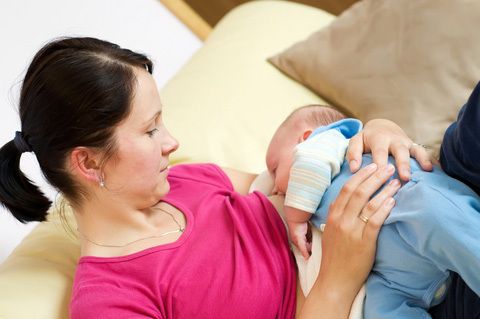Mothers Who Breast-Feed Are Viewed as Incompetent

Although breast-feeding provides proven health benefits for both mother and baby, women who choose to breast-feed are perceived as less competent than women who do not breast-feed, a new study suggests.
In one of their experiments, for instance, researchers found that the participants were less likely to hire a woman for a hypothetical job position once they learned she was breast-feeding.
Given the known benefits of breast-feeding, the study researchers were surprised by the results. "I would have had the opposite prediction, that breast-feeding would make somebody seem really competent because you're making this really well-informed decision," said Jessi Smith of Montana State University.
Breast-feeding women had said in previous studies they felt judged by others, but Smith said no studies documented that the observers in fact did hold a bias.
The new study was conducted in a laboratory setting, and the participants were all college students, so more research is needed to determine whether the results hold true in the real world.
The findings, based on three experiments, do not mean mothers should refrain from breast-feeding, Smith said.
"The message is not, 'Don't breast-feed, you'll be seen as incompetent.' We would never give that advice to women facing sexism or an older person facing ageism," Smith said. Instead, she said, health care professionals should advise breast-feeding mothers that they may experience this bias. In the future, employers and other members of society might be educated to correct it.
Sign up for the Live Science daily newsletter now
Get the world’s most fascinating discoveries delivered straight to your inbox.
Breast-feeding bias
In the experiments, women thought to be breast-feeding were rated by others as less competent and less capable in math and working ability than other women.
In two of the experiments, the participants did not actually meet the breast-feeding woman or witness the act of nursing. Instead, the participants in one study, for instance, viewed a fictional résumé that described the applicant as having written a book describing her experiences breast-feeding.
Smith said, "I can only imagine if, in fact, you came upon a person, a mother who did have an infant with her or had a breast pump with her … that the bias would be exaggerated even more."
In the final study, participants were grouped into pairs and asked to rate each other based on a profile they created about themselves. They also were asked whether they would hire their partner if they saw her profile on an employment website.
One of the subjects in each pair was secretly a confederate of the researchers who was "in" on the experiment. During a break in the session, the confederate would listen to a voice-mail message that was loud enough for the partner to overhear. The researchers alternated four messages, including one that implied the confederate was breast-feeding. Another message implied only that she was a mother, the third implied she had a boyfriend and owned a strapless bra, and the fourth was completely neutral.
The confederates who received the breast-feeding message or the message about the bra were rated lower in math and work competence and were less likely to be "hired" by their partners than were the confederates who listened to either of the other two messages.
In fact, the rating was about the same after the breast-feeding message and after the message about the bra, which in effect sexualized her breasts.
Why?
It's possible women who breast-feed are viewed as less competent because observers see the women as objects, as is sometimes the case when women are sexualized, Smith said.
"Incompetence comes because, when you think about an object, you don’t think of an object as something that’s intelligent or smart or thinking," Smith said.
To continue her research, Smith is now conducting a study involving actual breast-feeding mothers. The mothers are asked about biases they encounter while breast-feeding as well as whether they feel they are being viewed and judged as objects, she said.
The study was published March 18 in the journal Personality and Social Psychology Bulletin.
Pass it on: Breast-feeding women may be judged as less competent than women who do not breast-feed.
Follow MyHealthNewsDaily staff writer Rachael Rettner on Twitter @RachaelRettner.
This story was provided by MyHealthNewsDaily, a sister site to LiveScience.

Rachael is a Live Science contributor, and was a former channel editor and senior writer for Live Science between 2010 and 2022. She has a master's degree in journalism from New York University's Science, Health and Environmental Reporting Program. She also holds a B.S. in molecular biology and an M.S. in biology from the University of California, San Diego. Her work has appeared in Scienceline, The Washington Post and Scientific American.
Most Popular



